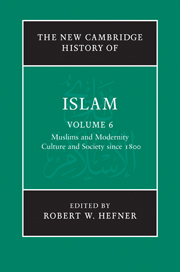Book contents
- Frontmatter
- 1 Introduction: Muslims and modernity: culture and society in an age of contest and plurality
- PART I SOCIAL TRANSFORMATIONS
- PART II RELIGION AND LAW
- 11 Contemporary trends in Muslim legal thought and ideology
- 12 A case comparison: Islamic law and the Saudi and Iranian legal systems
- 13 Beyond dhimmihood: citizenship and human rights
- 14 The ʿulamāʾ: scholarly tradition and new public commentary
- 15 Sufism and neo-Sufism
- PART III POLITICAL AND ECONOMIC THOUGHT
- PART IV CULTURES, ARTS AND LEARNING
- Glossary
- Bibliography
- Index
- References
14 - The ʿulamāʾ: scholarly tradition and new public commentary
from PART II - RELIGION AND LAW
Published online by Cambridge University Press: 28 March 2011
- Frontmatter
- 1 Introduction: Muslims and modernity: culture and society in an age of contest and plurality
- PART I SOCIAL TRANSFORMATIONS
- PART II RELIGION AND LAW
- 11 Contemporary trends in Muslim legal thought and ideology
- 12 A case comparison: Islamic law and the Saudi and Iranian legal systems
- 13 Beyond dhimmihood: citizenship and human rights
- 14 The ʿulamāʾ: scholarly tradition and new public commentary
- 15 Sufism and neo-Sufism
- PART III POLITICAL AND ECONOMIC THOUGHT
- PART IV CULTURES, ARTS AND LEARNING
- Glossary
- Bibliography
- Index
- References
Summary
Introduction
In modern times, the traditionally educated Muslim religious scholars, the ʿulamāʾ, often lament that their distinctive institutions have ceased to exist or to matter much, that their writings no longer receive the attention their religious expertise merits and that, in any case, their intellectual stature hardly compares with the major figures of earlier times. At least in this instance, observers and scholars of modern Islam tend to take the ʿulamāʾ at their word. It is true, of course, that the impact of colonial rule and the emergence of the post-colonial nation-states have radically altered all facets of life, including the religious. Even when Muslim societies are governed by fellow Muslims rather than by a colonial regime, the terms on which, and the sphere in which, religion is to operate are defined by the state rather than by the ʿulamāʾ; and the state itself is governed by a ‘modernist’ elite that is the product not of institutions of traditional Islamic learning, the madrasas, but rather of Westernised colleges and universities, with their own sense of what Islam means and how to make it compatible with the conditions of modernity. Other college- and university-educated Muslims, the ‘Islamists’, have sought a radical reinterpretation of the foundational Islamic texts, and the public implementation of Islamic norms, by challenging not only the modernist constructions of Islam but also the intellectual tradition of the ʿulamāʾ.
- Type
- Chapter
- Information
- The New Cambridge History of Islam , pp. 335 - 354Publisher: Cambridge University PressPrint publication year: 2010

